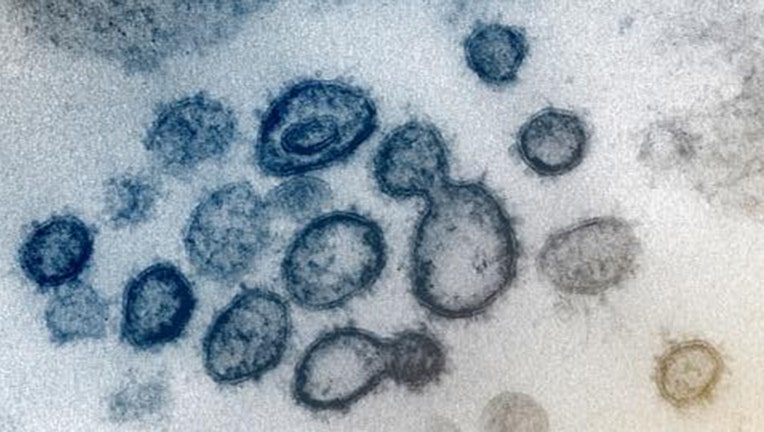COVID-19 antibody therapy to be distributed to Texas hospitals

A transmission electron microscope image shows SARS-CoV-2, also known as the 2019 novel coronavirus, which causes COVID-19, isolated from a patient in the United States. Note the crown-like spikes on the outer edge of the virus, hence the term "coron (NIAID-RML)
Governor Greg Abbott says a COVID-19 antibody therapy will be distributed to acute care hospitals in Texas as early as next week.
On Monday, U.S. health officials issued an emergency use authorization for the drug, called bamlanivimab, from Eli Lilly & Company. The Food and Drug Administration cleared the experimental drug for people 12 and older with mild or moderate COVID-19 not requiring hospitalization.
RELATED: FDA authorizes emergency use of Eli Lilly monoclonal antibody therapy to treat COVID-19
According to the governor’s office, the weekly shipments of doses have been provided to the state at no cost through the U.S. Department of Health and Human Services.
Officials say the Texas Department of State Health Services will allocate the initial distribution of bamlanivimab based on three criteria: new confirmed cases of COVID-19 in the community, new lab-confirmed COVID-19 admissions to hospitals, and total lab-confirmed COVID-19 patients in hospitals.
"This initial allotment of bamlanivimab will help health care professionals effectively treat cases of COVID-19 within their communities and aid in reducing hospitalizations," said Governor Abbott. "I thank the U.S. Department of Health and Human Services for providing Texas with this crucial antibody therapy that will help keep Texans safe and mitigate the spread of COVID-19."
SIGN UP FOR FOX 26 HOUSTON EMAIL ALERTS
It’s a one-time treatment given through an IV.
Early results suggest bamlanivimab may help clear the coronavirus sooner and possibly cut hospitalizations in people with mild to moderate COVID-19. A study of it in hospitalized patients was stopped when independent monitors saw the drug did not seem to be helping in that situation.
The therapy is still undergoing additional testing to establish its safety and effectiveness. It is similar to a treatment President Donald Trump received after contracting the virus last month.
The government previously reached an agreement to buy and supply much of the early production of Lilly’s drug.
Only one drug -- Gilead Sciences’ remdesivir -- has full FDA approval for treating COVID-19. Government treatment guidelines also back using dexamethasone and other steroids for certain severely ill, hospitalized patients.
RELATED: FDA approves Gilead Science's remdesivir as COVID-19 treatment

Here are the symptoms of COVID-19
Some of the most common symptoms are fever, a dry cough, shortness of breath and fatigue. But as the virus continues its rapid spread, additional symptoms are being identified.
One other treatment has an emergency use designation now — convalescent plasma, or the blood of COVID-19 survivors. No large studies have shown it to be more effective than usual care alone, however.
The new drug is part of an emerging family of biologic therapies that offer a promising new approach to preventing serious disease and death from COVID-19. Experts say the infused drugs could serve as a therapeutic bridge to help manage the virus until vaccines are widely available.
The drugs are laboratory-made versions of antibodies, blood proteins which the body creates to help target and eliminate foreign infections. The new therapies are concentrated versions of the antibodies that proved most effective against the virus in patient studies.
MORE: Pfizer says early data signals COVID-19 vaccine is 90% effective
Regeneron Pharmaceuticals Inc. also has asked for emergency authorization for an antibody drug it is testing, the one Trump received.
FDA regulators authorized the Lilly drug using their emergency powers to quickly speed the availability of experimental drugs and other medical products during public health crises.
In normal times the FDA requires “substantial evidence” to show that a drug is safe and effective, usually through one or more large, rigorously controlled patient studies. But during public health emergencies the agency can lower those standards and require only that an experimental treatment’s potential benefits outweigh its risks.
The emergency authorization functions like a temporary approval for the duration of the COVID-19 pandemic. To win full approval, Lilly will have to submit additional research to fully define the drug’s safety and benefit for patients.
MORE: US reports over 144K COVID-19 cases in new single-day record, according to Johns Hopkins
The government has signed an agreement with Lilly to spend $375 million to buy 300,000 vials of the drug. How many doses that would provide is unclear. Each vial contains 700 milligrams and that dose proved ineffective in the early results. It took four times that amount — 2,800 milligrams — to show any effect.
The Lilly drug is authorized for people 12 and older who weigh at least 40 kilograms (about 88 pounds), and who are at high risk for progressing to severe COVID-19 and/or hospitalization. This includes those who are 65 years of age or older, or who have certain chronic medical conditions.
The Associated Press contributed to this report.

